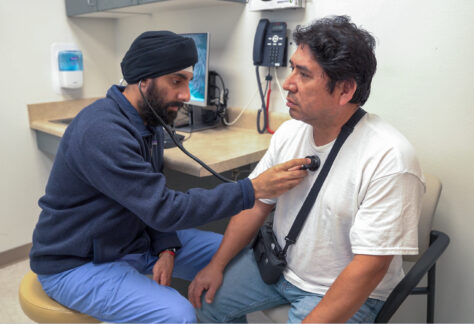In This Article:
- The ideal amount of sleep you should get depends on your age. Adults should aim for 7-9 hours. Teens require 8-10 hours. Children and infants’ needs range from 12-15 hours.
- A good night’s sleep reduces inflammation and brain toxins, regulates weight and hormones, promotes healthy development and improves immune function.
- To get better sleep, establish a regular schedule. Avoid screen time or exercise before bed. Don’t drink caffeine or alcohol close to bedtime.
We’ve all felt the negative impact of a bad night’s sleep – waking up cranky, feeling too tired to get our daily tasks done, maybe even suffering from headaches or weak muscles. Sleep plays a major role in our overall physical and mental health, and it’s important to monitor our sleep habits to make sure we’re always getting a full, restorative rest every night. Learning how to get better sleep can make a huge difference in your strength, health and energy levels in the long run.
How much sleep do I need?
The amount of sleep you need each night depends mostly on your age. On average, adults aged 26 to 64 should aim to get about 7 to 9 hours of solid sleep per night. This can vary based on daily activity, overall health and personal preference.
Younger people need much more sleep in order to function efficiently and ensure healthy growth. Infants need 12 to 15 hours per day (including naps), toddlers should get 11 to 14 hours, preschoolers need 10 to 13 hours, 6- to 13-year-olds need 9 to 11 hours, and teens should sleep 8 to 10 hours per night.
It’s important to help kids develop healthy sleep habits at a young age. Sleep plays a huge role in helping a child’s brain develop the capacity to retain long-term memories, solve problems, build positive relationships and more.
No matter how old you are, it’s important to make sure you’re getting solid, restorative sleep every day – this means trying to sleep through the night without waking up too much or staying awake too long. This restorative sleep is essential to making sure you wake up fully refreshed and with enough energy to get you through the day.
How does sleep impact your health?
A good night’s sleep benefits almost every system in your body, from your brain to your muscles and emotional well-being. Some of the most important benefits of healthy sleep habits include:
- Reduced inflammation
- Reduced toxins in brain
- Healthy growth and development
- Healthy regulation of essential hormones
- Regulates weight by increasing motivation to exercise, encouraging healthy food choices and balancing hormones that contribute to weight gain/loss
- Improves immune function
Insufficient sleep can leave people of all ages more vulnerable to getting sick or even developing more serious conditions. Even losing a couple of hours of sleep per night can cause impaired functioning as severe as you’d experience if you were drunk. Consistent lack of sleep can also cause mental health issues such as anxiety, depression or adjustment disorders.
Over time, poor sleep habits can also cause insulin resistance and high blood pressure, which can predispose you to diabetes, obesity and heart issues.
How can I get a good night’s sleep?
Establishing healthy habits before you go to bed and throughout the day can make a major impact on your ability to fall asleep quickly and get quality sleep. Here are a few tips to help you develop a healthy sleep pattern:
- As much as possible, try to go to bed and wake up at around the same time every day
- If you are an adult, it’s okay to take little naps if you need to refresh yourself throughout the day – however, experts recommend napping no more than twice a day for no longer than 20 minutes each. This will ensure your nap won’t disrupt your ability to fall asleep that night.
- Try to turn off your electronic devices (phone, TV, laptop) at least a half hour before bed.
- Don’t exercise too close to bedtime
- Don’t drink caffeine or alcohol within a few hours of going to bed
- If you have a hard time falling asleep, don’t stay in bed – get up and read or listen to soothing music in another room or on a chair until you feel ready to go back to bed
If you’d like more tips for better sleep or need to speak with a sleep specialist, book an in-person or telehealth appointment at Valleywise Health. Call 1 (833) VLLYWSE or visit ValleywiseHealth.org to learn more.







